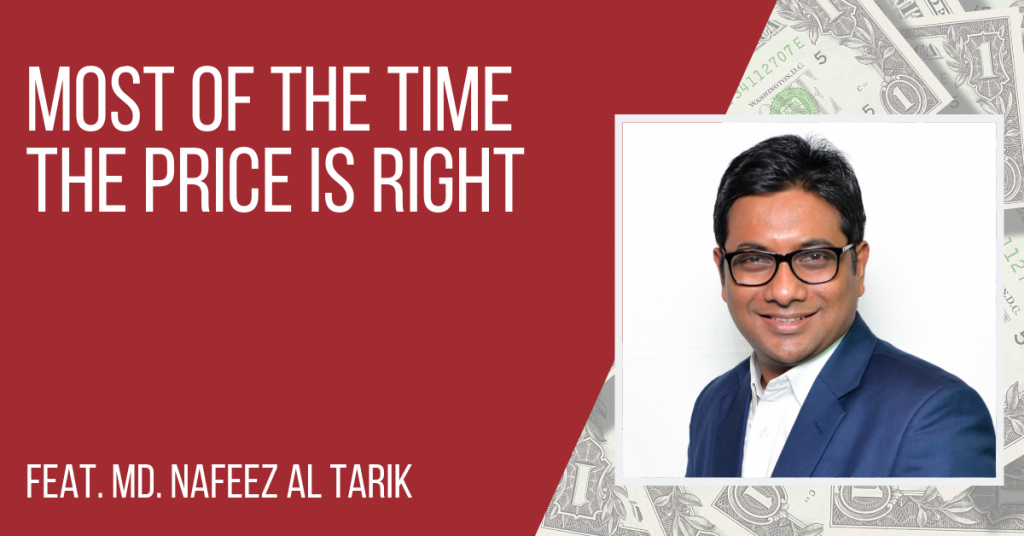Ep75: Md. Nafeez Al Tarik – Most of the Time the Price is Right

Listen on
Apple | Overcast | Stitcher | Spotify | Other
Guest profile
Md. Nafeez Al Tarik is head of research and investment at City Brokerage Limited in Bangladesh. He has eight years of research and investment experience in the equity markets of Bangladesh and provides his research to foreign and local institutions. Prior to working at City Brokerage, he served as the chief investment officer at Asia Tiger Capital Partners Asset Management Limited, where he was responsible for several mutual funds valued at around US$12 million. In 2015 and 2016, his flagship fund generated cumulative performance, with respect to the benchmark, of about 8%. He also had experience and expertise in asset liability management, having worked for the treasury department of Eastern Bank Limited and as an assistant vice president in Royal Bengal Investment Management Company Limited. Nafeez holds an MBA and a bachelor’s degree from the University of Dhaka, from the department of finance within the faculty of business studies. He’s also a CFA charterholder and a certified Financial Risk Manager (FRM). In his spare time, he’s an entrepreneur running the financial coaching institute, Professional Finance Studies, where he provides training in the fields of financial modeling, equity evaluation, risk management, advanced excel skills, and CFA and FRM preparation. He also has been a guest lecturer at the finance department of Jahangirnagar University, where he’s taught financial engineering and advanced financial engineering courses in the BBA and MBA programs. Finally, he’s also a CFA Society Bangladesh volunteer.
“I should have trusted the market and should have done some more due diligence to understand why the stock was falling with such large volume … I probably would have found that the asset quality was very poor compared to what I had thought, and from there I could have cut my position and taken a stop loss.”
Md. Nafeez Al Tarik
Lessons learned
- There are many value traps in the market so don’t fall for them.
- Most of the time, the price is right. You have to look at the price action and you have to go deeper than the mere appearance of the market, as price could be pointing to an internal problem.
- Particular due diligence is required when you are investing in banks. Look carefully at the board, governance, management, accounting policies, risk management policies, loan rights policies, and provisional policies. Listen to your peer analysts and fund managers, especially those who are taking the same kind of contrarian angle as you and pay attention to their hypotheses.
- Understand that you are a human being and we have a lot of biases. Pay attention to your behavioral biases. In Nafeez’s case, he had confirmation, conservatism, overconfidence, and status quo biases.
- Talk to management to get a feel for where they are coming from. Find out about them, what their incentives are, if they have any conflicts of interest, and, especially when your position is big, do extra due diligence.
- Asset allocation involves some key decisions. Think and research thoroughly so you can make appropriate asset allocation decisions. To do that effectively, the macro environment must be understood.
Andrew’s takeaways
- Properly analyze and manage risk. Some of the ways to do that are looking carefully at asset quality, putting in place some kind of stop loss, and carefully sizing the position you take in an investment. So if you like a stock, the decision as to how big a stake you will take in it for your portfolio is one that needs careful research and consideration.
- On banking, if asset quality drops, you can be wiped out as banks operate on low multiples. If the assets, meaning the loans that a bank has awarded, deteriorate just a little, say 10% of total assets, all loans at the bank can go bad, which can literally wipe out all the equity of the bank. Even in a bubble time, the multiples of banks will be lower than the multiples of the overall market.
- A great investment can go very wrong because of the macro environment. An investor must never dismiss the macro environment.
- The Price is Right. When Andrew was growing up, he remembers watching a TV game show called The Price Is Right. In the stock market, there are many people looking at the market, which affects what the price is. But there’s a paradox, the price is right, but in order to be a successful active fund manager, at some point you have to bet that the price is wrong. When you make that bet, you really must have a great amount of high-level research in support of that decision.
Connect with Md. Nafeez Al Tarik
Andrew’s books
- How to Start Building Your Wealth Investing in the Stock Market
- My Worst Investment Ever
- 9 Valuation Mistakes and How to Avoid Them
- Transform Your Business with Dr.Deming’s 14 Points
Andrew’s online programs
- Valuation Master Class
- Women Building Wealth
- The Build Your Wealth Membership Group
- Become a Great Presenter and Increase Your Influence
- Transform Your Business with Dr. Deming’s 14 Points

